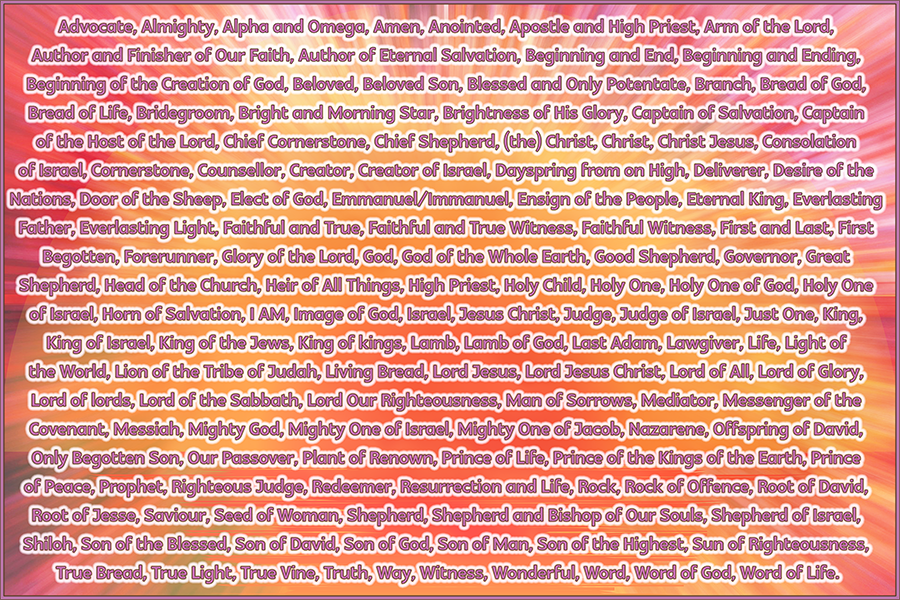I use God’s name, YHWH, often. While his name is used more than 6500 times in the oldest Hebrew Bible, it is rarely used in English translations. (The exception is Youngs Literal Translation (YLT).*
In place of his name, titles are used. The most common are God or Lord, but the titles El Shaddai, Adonai, or Elohim also appear.
The issue with “Lord” or “God” is that it must be defined by the reader. Which Lord or which God must be determined by context. Confusion follows, especially when “Lord” is frequently used biblically to identify two distinct beings. (I’ll go no further here).
El Shaddai means “God Almighty,” a title but not a name. Adonai is another title meaning “My Lord” or “My Master.” (Interestingly “Ba’al,” the detestable God of the Canaanites has the same “My Lord” meaning).
Elohi (singular) or Elohim (plural) means “Spiritual Being or Beings.” There are several biblical references to Elohim identifying very different beings.
But why does this matter?
It matters for clarity. Many people identify with their god. Muslims identify Allah while Sikhism knows Akal Purakh. These is Bahá, Hayyi Rabbi, Bhagavan, Aruman, Xwedê, Great Spirit and literally thousands more. Should we not want to identify our God for who He is?
Second; in ancient Hebrew times a name was much more than just an identification. To God and the Hebrews, a person’s name was also his character. Then, a name announced the person’s character and reflected such things as their honor, truthfulness, honesty, and faithfulness, (or the occasional absence thereof). A name was seriously guarded and protected against falsehoods or misrepresentations. Bringing dishonor to a person’s name was a very serious matter.
Finally, God intentionally gave his name to His People. He wants us to know his name. He wants us to acknowledge him for who He is, to remember His character and qualities, and to distinguish Him from all the other lesser gods created by man’s hands.
I guess this is just another of my quirks!
*https://blogs.blueletterbible.org/blb/2012/07/18/the-names-of-god-yahweh (et.al)
In place of his name, titles are used. The most common are God or Lord, but the titles El Shaddai, Adonai, or Elohim also appear.
The issue with “Lord” or “God” is that it must be defined by the reader. Which Lord or which God must be determined by context. Confusion follows, especially when “Lord” is frequently used biblically to identify two distinct beings. (I’ll go no further here).
El Shaddai means “God Almighty,” a title but not a name. Adonai is another title meaning “My Lord” or “My Master.” (Interestingly “Ba’al,” the detestable God of the Canaanites has the same “My Lord” meaning).
Elohi (singular) or Elohim (plural) means “Spiritual Being or Beings.” There are several biblical references to Elohim identifying very different beings.
But why does this matter?
It matters for clarity. Many people identify with their god. Muslims identify Allah while Sikhism knows Akal Purakh. These is Bahá, Hayyi Rabbi, Bhagavan, Aruman, Xwedê, Great Spirit and literally thousands more. Should we not want to identify our God for who He is?
Second; in ancient Hebrew times a name was much more than just an identification. To God and the Hebrews, a person’s name was also his character. Then, a name announced the person’s character and reflected such things as their honor, truthfulness, honesty, and faithfulness, (or the occasional absence thereof). A name was seriously guarded and protected against falsehoods or misrepresentations. Bringing dishonor to a person’s name was a very serious matter.
Finally, God intentionally gave his name to His People. He wants us to know his name. He wants us to acknowledge him for who He is, to remember His character and qualities, and to distinguish Him from all the other lesser gods created by man’s hands.
I guess this is just another of my quirks!
*https://blogs.blueletterbible.org/blb/2012/07/18/the-names-of-god-yahweh (et.al)
-
1
-
1
- Show all


